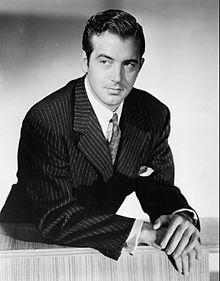The Silver Theatre

The Silver Theatre is an American television series that was broadcast on CBS from October 3, 1949, to June 26, 1950,[1] and was hosted by Conrad Nagel.[2] It was also known as Silver Theater.[3]
Most of the show's episodes focused on "the humorous, silly, frustrating, futile, and rewarding aspects" of romance.[1]
Among its guest stars were Hugh Beaumont, Ward Bond, Ann Dvorak, William Frawley, Eva Gabor, Margaret Hamilton, Marsha Hunt, Kim Hunter, Paul Lukas, Diana Lynn, Burgess Meredith, Felicia Montealegre Bernstein, John Payne, George Reeves, and Gig Young.
Each month a group of dramatic critics selected the winner of the Silver Award, which went to "the most deserving supporting performer" in the episodes presented that month.[1]
Episodes
| Date | Title | Actor(s) |
|---|---|---|
| October 3, 1949 | "L'Amour the Merrier" | Gabor, Meredith, Nagel[4] |
| October 10, 1949 | "'Til Death Do Us Part" | John Loder, Faye Emerson[4] |
| October 17, 1949 | "Rhapsody in Discord" | Paul Lukas, Kim Hunter[5] |
| October 31, 1949 | "Farewell Supper" | Charles Korvin[3] |
| December 26, 1949 | "Four Callers" | Donald Buke, Mary K. Wells, Florence Robinson, Vaughn Taylor, Jim Engler[6] |
| January 2, 1950 | "The First Show of 1950" | Reeves[3] |
| February 20, 1950 | "My Brother's Keeper" | Bond, Glenn Corbett[3] |
| April 10, 1950 | "Minor Incident" | Nancy Kelly[3] |
| April 24, 1950 | "Bad Guy" | Lee Bowman, John Archer, Barbara Lawrence[4]: 195 |
| May 1, 1950 | "The First Hundred Years" | Barbara Whiting, Frawley, Jimmy Lydon, Allene Roberts[4]: 195 |
| May 8, 1950 | "Lady with Ideas" | Pamela Britton, Young, Mikhail Rasumny[4]: 195 |
| May 15, 1950 | "Papa Romani" | Frawley, Hamilton, Chico Marx[3] |
| June 12, 1950 | "My Heart's in the Highlands" | Howard da Silva[3] |
Production
Frank Telford was the program's producer[7] and director. Richard Stark was the announcer. The show was sponsored by the International Silver Company[8] and was broadcast from 8 to 8:30 p.m. Eastern Time on Mondays.[1] Its competition included The Chevrolet Tele-Theatre on NBC.[9]
Episodes were presented live until February 20, 1950, when the program's first filmed episode, "My Brother's Keeper", was shown. Production techniques were similar to those for live broadcasts except for the use of film in the cameras. The change was "the initial attempt by video producers to overcome the deficiencies of kinescope recordings".[10] By early March 1950, executives at the Young & Rubicam agency decided to film more episodes of the show "on a mass production basis on the Coast."[11] Broadcasts originated from WCBS-TV.[8]
Seventeen filmed episodes of the program were leased and rerun as episodes of The Bigelow Theatre.[12]
References
- ^ a b c d Brooks, Tim; Marsh, Earle (1999). The Complete Directory to Prime Time Network and Cable TV Shows 1946-Present (7th ed.). New York: The Ballentine Publishing Group. p. 920. ISBN 0-345-42923-0.
- ^ Slide, Anthony (2010). Silent Players: A Biographical and Autobiographical Study of 100 Silent Film Actors and Actresses. University Press of Kentucky. ISBN 978-0-8131-2708-8. Retrieved February 3, 2022.
- ^ a b c d e f g McNeil, Alex (1996). Total Television: the Comprehensive Guide to Programming from 1948 to the Present (4th ed.). New York, New York: Penguin Books USA, Inc. p. 755. ISBN 0-14-02-4916-8.
- ^ a b c d e Hawes, William (November 16, 2015). Live Television Drama, 1946-1951. McFarland. p. 185. ISBN 978-1-4766-0849-5. Retrieved April 8, 2023.
- ^ "Radio: Program Preview, Oct. 17, 1949". Time. October 17, 1949. Retrieved July 10, 2024.
- ^ "Monday, December 26". Ross Reports. December 25, 1949. p. 4. Retrieved September 8, 2023.
- ^ "Tele Follow-Up Comment". Variety. February 1, 1950. p. 32. Retrieved December 24, 2022.
- ^ a b "Silver Theater". Ross Reports on Television including The Television Index. June 18, 1950. p. 6. Retrieved April 7, 2023.
- ^ Rosen, George (February 1, 1950). "TV in a hit-or-miss slump: 'AM hangovers' seen deterrent". Variety. p. 31. Retrieved April 9, 2023.
- ^ Lohman, Sidney (February 20, 1950). "News and Notes of Television". The New York Times. p. X 11. Retrieved April 8, 2023.
- ^ "Start of TV Programming Trek West Seen; Fairbanks System Is Hypo". Variety. March 8, 1950. p. 1. Retrieved April 9, 2023.
- ^ "Reissues of 'Silver' Show To Pay Talent". Billboard. September 30, 1950. Retrieved 30 March 2015.
